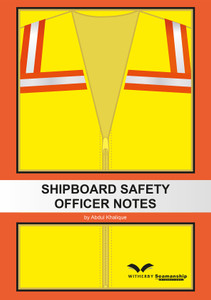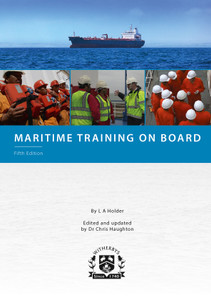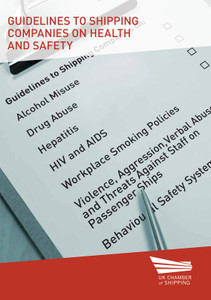
This publication provides an international standard for the safe management and operation of ships and for pollution prevention. It is an essential reference for maritime administrations, shipowners and operators, shipping companies, training providers and education institutes, shipbuilders, engine and equipment manufacturers and others with interest in ensuring safety at sea and prevention of damage to the environment.
This publication includes the texts of SOLAS chapter IX and the ISM Code. Additionally, Guidelines for the operational implementation of the International Safety Management (ISM) Code by Companies, Guidance on the qualifications, training and experience necessary for undertaking the role of the designated person under the provisions of the ISM Code, Guidance on near-miss reporting, Guidelines on Maritime Cyber Risk Management and resolution MSC.428(98) on Maritime Cyber Risk Management in Safety Management Systems are included.
Foreword
With the entry into force, on 1 July 1998, of the 1994 amendments to the International Convention for the Safety of Life at Sea (SOLAS), 1974, which introduced a new chapter IX into the Convention, the International Safety Management (ISM) Code was made mandatory. Chapter IX was amended by resolution MSC.99(73), which entered into force on 1 July 2002, and by resolution MSC.194(80), which entered into force on 1 January 2009.
The Code’s origins go back to the late 1980s, when there was mounting concern about poor management standards in shipping. Investigations into accidents revealed major errors on the part of management, and in 1987 the IMO Assembly adopted resolution A.596(15), which called upon the Maritime Safety Committee to develop guidelines concerning shipboard and shore-based management to ensure the safe operation of ro–ro passenger
ferries.
The ISM Code evolved through the development of the Guidelines on management for the safe operation of ships and for pollution prevention, adopted in 1989 by the IMO Assembly as resolution A.647(16), and the Revised Guidelines, adopted two years later as resolution A.680(17), to its current form, the International Management Code for the Safe Operation
of Ships and for Pollution Prevention (International Safety Management (ISM) Code), which was adopted in 1993 as resolution A.741(18). This Code was amended in December 2000 by resolution MSC.104(73), and these amendments entered into force on 1 July 2002. It was further amended in December 2004 by resolution MSC.179(79), and these amendments
entered into force on 1 July 2006. It was further amended in May 2005 by resolution MSC.195(80), and these amendments entered into force on 1 January 2009. The ISM Code was also amended in December 2008 by resolution MSC.273(85). This resolution was adopted on 1 January 2010, and the amendments entered into force on 1 July 2010. The Code was further amended in June 2013 by resolution MSC.353(92) and these amendments
entered into force on 1 January 2015.
In 1995, the IMO Assembly, recognizing the need for uniform implementation of the ISM Code and that there might be a need for Administrations to enter into agreements in respect of the issuance of certificates by other Administrations in accordance with SOLAS chapter IX and the ISM Code, adopted the Guidelines on implementation of the International Safety Management (ISM) Code by Administrations by resolution A.788(19). Revised Guidelines adopted by resolution A.913(22) in November 2001, and subsequently by resolution A.1022(26) in December 2009. These Guidelines were replaced with Revised Guidelines on the implementation of the International Safety Management (ISM) Code by Administrations which were adopted by resolution A.1071(28) in December 2013, which
in turn have been revoked by the new Revised Guidelines, as adopted by resolution A.1118(30) with effect from 6 December. Resolution A.1118(30) revokes resolution A.1071(28) with effect from 6 December 2017.
This publication includes the texts of SOLAS chapter IX and the ISM Code. Additionally, Revised Guidelines for the operational implementation of the International Safety Management (ISM) Code by Companies (MSC-MEPC.7/Circ.8), Guidance on the qualifications, training and experience necessary for undertaking the role of the designated person under the provisions of the ISM Code (MSC-FAL.7/Circ.6), Guidance on near-miss reporting (MSC-MEPC.7(Circ.7), Guidelines on Maritime Cyber Risk Management (MSC-FAL.7/Circ.3) and Maritime Cyber Risk Management in Safety Management Systems (resolution MSC.428(98)) are included.
The footnotes given in this Code are inserted for reference and guidance purposes and do not constitute requirements under the Code. However, in accordance with paragraph 1.2.3.2, all relevant guidelines, recommendations, etc. should be taken into account.
Foreword
International Convention for the Safety of Life at Sea, 1974, as amended
Chapter IX
Management for the safe operation of ships
Resolution A.741(18)
International Management Code for the Safe Operation of Ships and for Pollution Prevention
(International Safety Management (ISM) Code)
International Safety Management Code
Preamble
Part A Implementation
Part B Certification and verification
Appendix Forms of the Document of Compliance, the Safety Management Certificate,
the Interim Document of Compliance and the Interim Safety Management Certificate
Guidelines
Resolution A.1071(28)
Revised Guidelines on the implementation of the International Safety Management (ISM) Code by Administrations
MSC-MEPC.7/Circ.8
Revised Guidelines for the operational implementation of the International Safety Management (ISM) Code by companies
MSC-MEPC.7/Circ.6
Guidance on the qualifications, training and experience necessary for undertaking the role of the designated person under the provisions of the International Safety Management Code
MSC-MEPC.7/Circ.7
Guidance on near-miss reporting
Resolution MSC.428(98)
Maritime Cyber Risk Management in Safety Management Systems
MSC-FAL.1/Circ.3
Guidelines on Maritime Cyber Risk Management
A??s a specialized agency of the United Nations, IMO is the global standard-setting authority for the safety, security and environmental performance of international shipping. Its main role is to create a regulatory framework for the shipping industry that is fair and effective, universally adopted and universally implemented. ?
In other words, its role is to create a level playing-field so that ship operators cannot address their financial issues by simply cutting corners and compromising on safety, security and environmental performance. This approach also encourages innovation and efficiency.
Shipping is a truly international industry, and it can only operate effectively if the regulations and standards are themselves agreed, adopted and implemented on an international basis. And IMO is the forum at which this process takes place.
- Number of Pages:
- 91
- ISBN:
- 9789280116960
- Published Date:
- May 2018
- Binding Format:
- Paperback
- Book Height:
- 210 mm
- Book Width:
- 150 mm
- Weight:
- 0.1 kg
- Author:
IMO
- Preview:
- Yes
- Publication Date:
- April 2018






